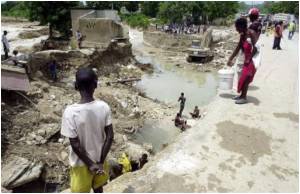International donors and Haitians are increasingly frustrated at the slow pace of recovery and reconstruction, with millions still homeless.

International donors and Haitians are increasingly frustrated at the slow pace of recovery and reconstruction, with rubble still filling the streets and millions of homeless struggling to survive in some 1,300 tent cities.
But determined to get on with her life, Colin, who lives in a camp in what was an upscale golf club in Petionville, wasted no time relaunching her beauty parlor under the cramped tarpaulin she shares with family.
Her new surroundings can't compare to her once-thriving brick and mortar, modern salon though.
"Oh, it was chic," she sighed, looking around at the dirt floor covered by a blue plastic tarp, and peering out the open doorway that looks out onto drainage trenches and a steep path that turns to mud when it rains.
"It wasn't like this. It had everything," she said, a tinge of nostalgia in her voice. "I can manage to work here, but I'm still missing a lot of things. Like hair dryers, and I don't have electricity."
Advertisement
Manicures and pedicures are less than three dollars, acrylic tips about 1.20 dollar extra. Getting your hair washed and styled costs about 10 dollars. Colin wants women to be able to afford the little luxuries she can offer.
Advertisement
Others, like Katiana Mugascin, a 25-year-old customer of two years, live in this same camp for internally displaced people, and are clinging to a weekly ritual that just feels good.
"I don't feel okay at all, because I am not used to living like this," said Mugascin, looking in the mirror at her newly-shaped eyebrows.
"And we are all traumatized because of the earthquake," she said.
But she quickly smiled and began laughing, saying being in the salon feels just like before, since it's a chance to laugh and joke around, in a brief diversion from the harsh realities of daily life outside.
International aid groups discourage people from establishing anything permanent in the camps, since they are only supposed to be temporary shelters.
Mugascin and Colin both stressed they plan to rebuild their homes and move out of the camp as soon as possible.
"She is really brave to pull this off with the meager means she has right now," said Colin's sister Farah, who helps out at the salon.
The younger woman looked on with pride as her sister adjusted acrylic tips on another client's pedicure and added: "It's a really big success."
The salon makes roughly 20 to 40 dollars a day, and Colin says she has even managed to get many new customers by setting up shop in the camp.
Her's is one of a handful of make-shift salons. But her loyal clients say it's the best.
Source-AFP
TAN









